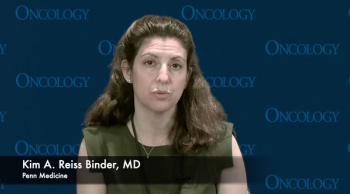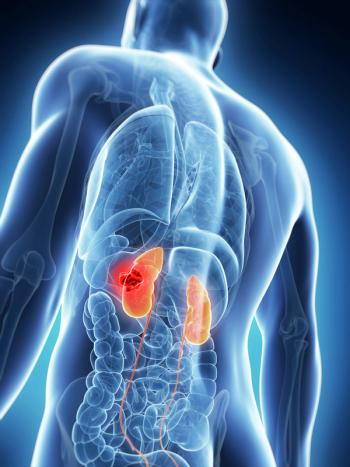
Based on results from the phase 3 DESTINY-Breast04 trial, the FDA has approved fam-trastuzumab deruxtecan-nxki as an intravenous infusion for patients with unresectable or metastatic HER2-low breast cancer.

Your AI-Trained Oncology Knowledge Connection!


Ariana Pelosci, managing editor for CancerNetwork® and the journal ONCOLOGY®, has been with the team since June 2021. She specializes in both web and print, and runs the social media accounts for CancerNetwork®.
She graduated from the University of Delaware, where she studied Media Communications and minored in journalism and marketing. At heart, she is a Jersey girl, and you can always find her down the shore during her free time.
Ariana loves to read, specifically historical or contemporary fiction. Follow Ariana on Twitter @APelosci or email her at apelosci@mjhlifesciences.com.

Based on results from the phase 3 DESTINY-Breast04 trial, the FDA has approved fam-trastuzumab deruxtecan-nxki as an intravenous infusion for patients with unresectable or metastatic HER2-low breast cancer.

Acalabrutinib tablet formulation was approved by the FDA for patients with chronic lymphocytic leukemia/small lymphocytic leukemia and relapsed or refractory mantle cell lymphoma.

Results from the phase 3 KEYNOTE-921 trial showed the primary end points of overall survival and radiographic progression-free survival were not met despite a trend towards improvement following treatment with pembrolizumab and docetaxel in patients with metastatic castration-resistant prostate cancer.

Findings from the planned futility interim analysis of the phase 3 INTERLINK-1 trial has led to the study’s termination after monalizumab and cetuximab did not meet efficacy end points in recurrent or metastatic squamous cell carcinoma in the head and neck.

Results from the phase 3 IMscin001 trial indicated that atezolizumab given subcutaneously vs intravenously yielded non-inferior pharmacokinetics for patients with immunotherapy-naïve locally advanced or metastatic non–small cell lung cancer.

Based on results from a phase 3 trial, the FDA has accepted a biologics license application for and granted priority review to omidubicel for those with hematologic malignancies who require allogenic hematopoietic stem cell transplant.

Patients with stage III non–small cell lung cancer and baseline grade 1 radiation pneumonitis post-chemotherapy could benefit from treatment with durvalumab.

Kim A. Reiss Binder, MD, spoke about the phase 1 CARISMA trial which investigated CAR macrophages in HER2-overexpressing solid tumors.

Results from a phase 2 study indicated that adding elotuzumab to carfilzomib, lenalidomide, and dexamethasone with a minimal residual disease–adapted design boosted responses for those with newly diagnosed multiple myeloma.

Investigators reported that vaccinated patients had a higher rate of grade 2/3 cervical neoplasia due to non–vaccine preventable human papillomavirus compared with unvaccinated patients, an event commonly termed clinical unmasking.

Treatment with radiotherapy for head and neck cancer resulted in taste dysfunction during treatment and 3 months thereafter, although reduction in oral cavity intensity-modulated radiotherapy dose may result in early taste function recovery.

Results from a phase 1b/2 trial indicated that niraparib plus nivolumab yielded superior progression-free survival at 6 months vs niraparib and ipilimumab for patients with platinum-sensitive advanced pancreatic cancer.

Elotuzumab, lenalidomide, high-dose melphalan, as well as umbilical cord blood–derived natural killer cells and autologous stem cell transplant demonstrated tolerability and improved transplant outcomes for high-risk multiple myeloma.

Findings from the phase 2 TRANSCEND-PILOT-017006 supported the use of lisocabtagene maraleucel as a second-line treatment for patients with large B-cell lymphoma who were not able to or didn’t want to receive hematopoietic stem cell transplant.

Serial postoperative ctDNA analysis could be a useful tool in guiding treatment decisions and improving care for patients with stage III colorectal cancer.

Radical proctectomy, external beam radiotherapy, and brachytherapy yielded comparable prostate cancer–specific mortality, while external beam radiotherapy with or without brachytherapy resulted in favorable distant metastases outcomes in patients with high-risk prostate cancer.

Results from cohort K of the phase 1b/2 KEYNOTE-869 trial showed improved responses for patients with advanced or metastatic urothelial carcinoma when treated with enfortumab vedotin-efjv plus pembrolizumab.

A health-related quality of life survey found similar outcomes between those treated with pembrolizumab plus axitinib vs sunitinib in advanced renal cell carcinoma.

Findings from the phase 1/2 FAKTION trial indicated that survival had increased following the addition of capivasertib to fulvestrant for patients with aromatase inhibitor–resistant, estrogen receptor–positive, HER2-negative advanced breast cancer.

Trastuzumab deruxtecan was granted priority review by the FDA for patients with unresectable advanced or metastatic HER2-low breast cancer.

The primary end points of progression-free survival and overall survival were not met in the phase 3 OVAL trial assessing ofranergene obadenovec for patients with platinum-resistant ovarian cancer.

Patients with solid tumors undergoing treatments with chemotherapy, immunotherapy, or chemoimmunotherapy mounted an adequate antibody response to the mRNA-1273 COVID-19 vaccine.

Results from a phase 1/2 trial highlighted improved clinical outcomes for patients receiving eltanexor monotherapy for relapsed/refractory myelodysplastic syndrome.

Dexamethasone, Cisplatin, gemcitabine, and pegaspargase resulted in improved preliminary outcomes vs dexamethasone, methotrexate, ifosfamide, L-asparaginase, and etoposide for patients with newly diagnosed locally advanced stage III or IV extranodal natural killer/ T-cell lymphoma.

Investigators reported a reduction in racial and ethnic disparities among patients with de novo stage IV breast cancer following implementation of Medicaid expansion, and included a decreased risk of death for patients in a racial/ethnic minority compared with White patients.

Patients with pancreatic and extrapancreatic neuroendocrine tumors treated with atezolizumab plus bevacizumab experienced consistent clinical responses and a progression-free survival consistent with other therapies.

CV-01 delivery of sonodynamic therapy has been granted orphan drug designation and fast track designation by the FDA for the treatment of recurrent glioblastoma.

The FDA has delayed the decision to approve tislelizumab monotherapy for patients with advanced or metastatic esophageal squamous cell carcinoma following prior systemic therapy, due to COVID-19 travel restrictions.

At 24 months of follow-up, MRI-guided focused ultrasound focal therapy was found to be safe and effective for patients with grade group 2 or 3 prostate cancer.

The FDA has accepted a biologics license application for vic-trastuzumab duocarmazine for patients with HER2-positive unresectable locally advanced or metastatic breast cancer.